Back in Class – (Mid)Life Lessons
Posted on August 2, 2010 by bob in Features
by Lenore Vickrey
Been in a college classroom lately? Chances are, there are more than a few gray heads sitting at the desks. Tim Gotkiewicz is such a student. At age 52, the retired Navy commander master chief is on track to earn his bachelor’s degree in management of human resources from Faulkner University.
“My classmates tell me I study way too much,” he said, laughing. “But I love it.”
Last year, Gotkiewicz moved from Florida to Montgomery with his wife so he could pursue his dream of earning a college degree, something he never completed during his 29 years in the Navy. He’d always wanted to go to Faulkner, but financially couldn’t swing it. With the help of the new GI Bill and the Veterans Administration, however, Gotkiewicz got the financial help he needed to enroll in classes in September 2009. He’s probably the oldest person in his Monday night class, but that’s fine with him.
“Being retired, I get the opportunity to do a lot more preparation and I take full advantage of that time,” he said. “At my age, I know what this education really means.”
It’s a familiar refrain with other over-50 students enrolled in Montgomery area colleges who’ve gone back to the classroom either to complete a degree, earn a new degree, or simply audit classes for their own enjoyment. Several campuses offer accelerated degree programs designed for older students who want to complete degrees on a fast track.
Nationally, the college student population is older than a generation ago, according to the American Council on Education. In 2007, more than a third of people studying for an associate or higher degree were 25 and older, and this group is expected to grow 20 percent by 2017, according to the U.S Department of Education
In Alabama, 3,699 students over the age of 50 are currently enrolled in public two and four-year college classes, according to the Alabama Commission on Higher Education. That represents about 2% percent of the total enrollment, but doesn’t count private institutions.
“Institutions are accommodating students at all levels despite reduced funding and limitations brought on by the economy,” said Gregory G. Fitch, executive director of the Alabama Commission on Higher Education. “We do see overall growth which includes older students.”
Dr. Olin Wesley, Director of Continuing Education at Alabama State University, noticed this trend three years ago as older students increasingly sought to take classes in computer and finance courses, in particular. While the current economy has somewhat slowed this trend, he says ASU still attracts older students, especially those seeking degrees in education and pre-licensure certification for the Alabama real estate exam.
“The older students are typically more motivated than the youth,” Wesley says. “They have more stick-to-it-tive-ness because they see the long-term benefit. They’re also more inquisitive.”
Pam Tharp, 50, was definitely motivated when she registered for classes at Troy University Montgomery after being out of school for more than 30 years.
“Had I chosen to go to college right after high school, like so many of my friends did, I don’t believe I would have done as well or accomplished as much as I have in my first two years at Troy. I know in my heart at 18 years old I would not have been half as dedicated or determined and committed as I am now at 50,” she said.
Tharp, an English major who wants to be a writer, is one of the nearly 200 students over the age of 50 enrolled at Troy Montgomery, according to Vice Chancellor Ray White. She is typical of students who’ve been out of a school environment for many years, but who, with their youthful years behind them, come to the classroom “as more mature individuals who are ready to learn. They are also more fully aware of the benefits and the importance of getting the college degree to enhance their careers,” he said. Troy Montgomery “has always been suited for the older working adult because this is the group that typically works all day, has a family, and goes to school at night.”
The older adult student can bring “years of work experience to the classroom, which greatly enhances the textbook instruction,” White added. Plus, “they are great mentors for the younger students who haven’t had the same level of experiences in life and the workplace.”
Like many of her classmates, Tharp works full time while pursuing her degree. She works at the college cafeteria, convenience store and as assistant in catering and events, and also writes poetry and sells her original bookmarks at bookstores and gift shops. She expects to graduate in 2012 or 2013, and is excited about the experience and what lies ahead.
“In my second year as an English major, I am learning how to be the best at what I do while building a confidence and foundation within myself to see it through,” she said.
Berenice Artis, 53, is a single parent and retired Army staff sergeant who works full time for the Department of Corrections while working toward a degree in criminal justice through Faulkner’s accelerated degree program. On Tuesdays and Thursday, she leaves work at 5 p.m. and gets to campus in time for her first class at 5:40 and won’t leave until 10 p.m. By December 2011, she will have a bachelor of science degree and then plans to earn a master’s by 2012.
“Having two degrees will help me get a promotion, and it will help me be familiar with and have insight into the criminal laws,” she said. “I associate what I’m learning with what I’ve seen at my job.” Classes last eight weeks. “It’s a lot of information in a short time span.”
Huntingdon College also offers an accelerated degree option through its Adult Degree Completion Program, with classes lasting five weeks, meeting one night a week for four hours, according to Tommy Dismukes, director.
“Classes are all in person, not online,” he said of the program that’s been going on for about eight years. Designed to match the lifestyle of working persons with families, the program has about 300 students enrolled at sites in Montgomery, the Birmingham area, Clanton, Pell City, Enterprise, Bay Minette, Brewton and Daphne.
Jackie Kennedy Amis, 56, coordinator of community and public affairs at WVAS radio, is working towards a bachelor’s degree in business management at Huntingdon.
“I’m finishing my third year now,” she said. A former journalism major, she always regretted not getting a degree in business, but is now taking classes once a week to fulfill her goal. She’ll even be commuting to Huntingdon’s Birmingham campus for her next class in statistics.
Going back to school in her 50s hasn’t been that big of an adjustment, she said, even though she’s likely older than her classmates. Once, when one of her instructors asked the class if they’d done their homework, the teacher seemed amazed that they had done so. Jackie assured her: “We’re here not because mama made us, but because we want to be!”
Not all older adults in the classroom are there to earn credits or are interested in getting a degree, however, and there are places for them as well.
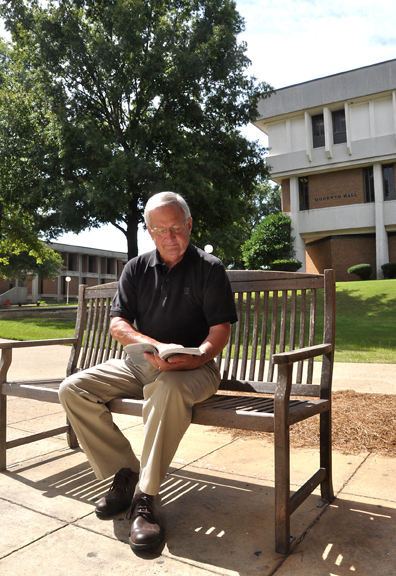
Harry Truslow reads before the start of the third class he's taken under AUM’s Senior Guest Program. His current course is on Vietnam.
Harry Truslow retired in March 2009 after 22 years with the U.S. Department of Justice. He’d already given 20 years to the Air Force. At age 65, he was looking for “productive ways to spend my free time in retirement.” He found it at the Senior Guest Program at Auburn University Montgomery. Designed for adults 60 and over, the program gives seniors the chance to enroll, at no charge, in regular college courses without credit or required tests or assignments.
“We do pay for our books,” Truslow said. “I have taken one class each semester: International Relations, History of Conflict, Applied Ethics.” He’s currently taking a class on Vietnam on Monday and Wednesday mornings, which is of special interest to him as a Vietnam veteran.
“I simply review the schedule each semester and pick out a couple of classes I think would be interesting and see which are available,” he said. “I enjoy the interaction with other students and learning more about a variety of topics.”
Other universities also allow auditing of classes, and admission requirements and cost vary. Adults 60 and older are also eligible for the Senior Adult Scholarship Program through Alabama’s Community College System. This program covers tuition for certain classes based on space availability.
ACHE’s Fitch says colleges and universities will continue to adapt to the demands of older and working students by offering classes at night, weekends and online.
There is no age at which learning should stop. Education, whether for career advancement or solely for personal growth, is not a destination, but a journey of enrichment and discovery.










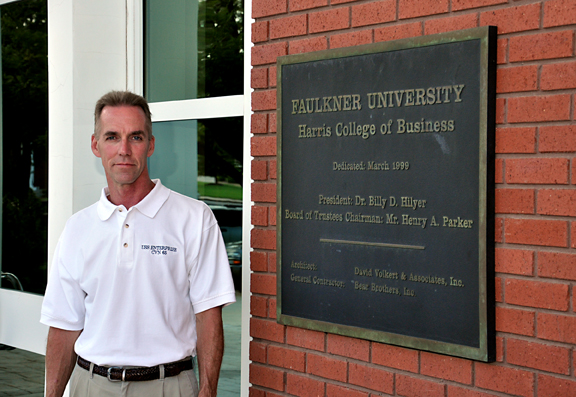
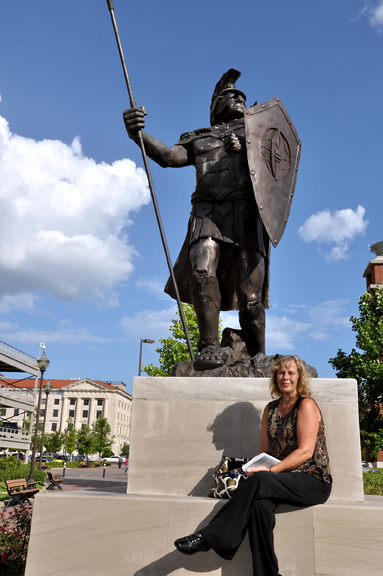
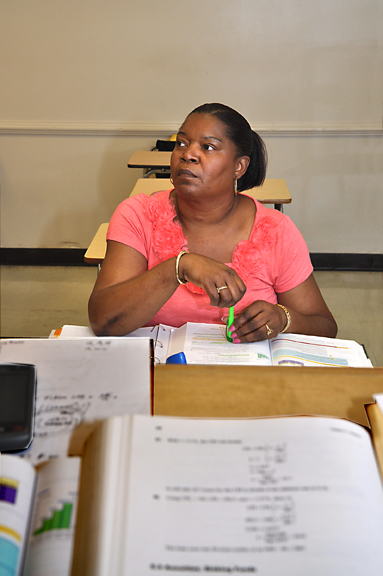
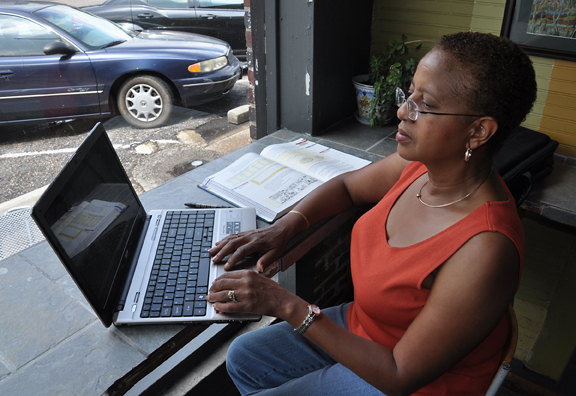

10 Responses to “Back in Class – (Mid)Life Lessons”